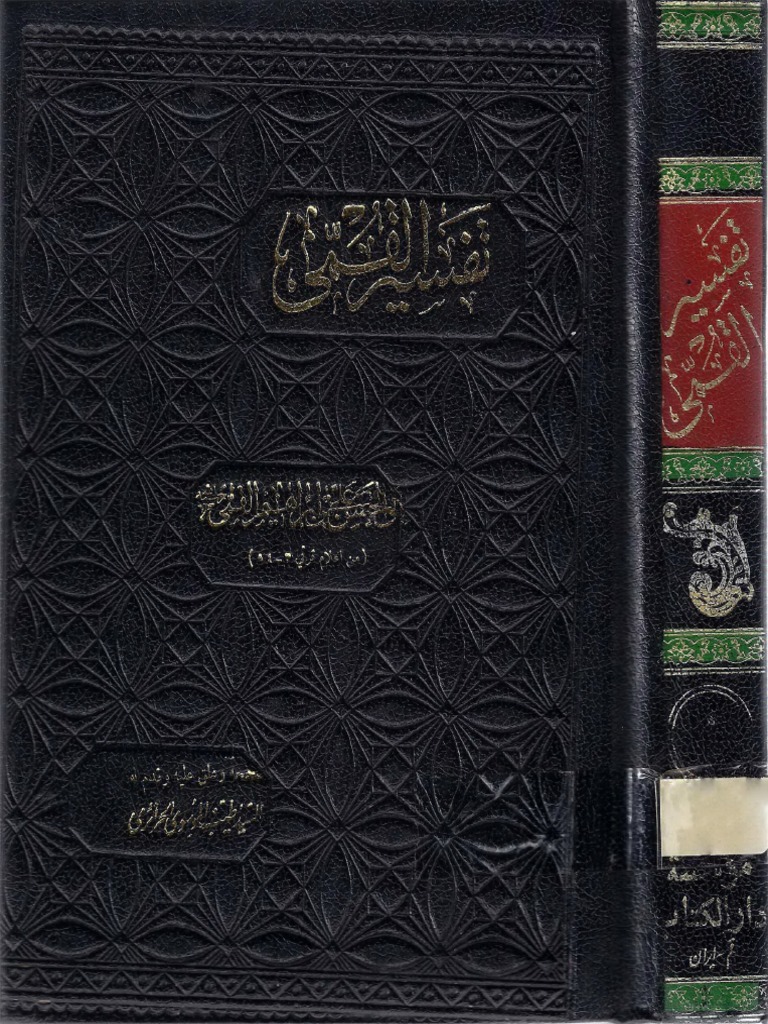Within the vast expanse of Islamic scholarship, Shia teachings present a unique and compelling interpretation of the Quran. Among the wealth of literature that enriches this tradition, "Tafsir al-Qummi" stands as a seminal work, providing profound insights into the Quranic text. The author of this celebrated tafsir, Ali ibn Ibrahim al-Qummi, produced this illustrious commentary during the 9th century. It has since been revered for its theological depth, historical context, and exegetical clarity.
At first glance, "Tafsir al-Qummi" might seem like another interpretative exercise in Quranic literature, yet it captivates scholars and laypersons alike. This fascination often stems from the intricate interplay of theological exposition and narrational style, reflecting the author's profound engagement with both the Quran and the prophetic traditions (hadith). By employing a meticulous approach to interpretation, al-Qummi succeeds in elucidating abstruse concepts that resonate deeply with Shia belief systems.
Central to al-Qummi's tafsir is his reliance on authentic sources, particularly the sayings of the Imams of the Shia tradition. This approach not only enhances the credibility of his interpretations but also imbues them with a spiritual essence that appeals to Shia identity. The reliance on Imami sources echoes a communal quest for understanding that transcends mere textual analysis; it seeks to imbue the Quran with lived spiritual significance. By grounding his interpretations in the teachings of the Imams, al-Qummi effectively bridges the sacred text with Shia doctrines, enriching the reader's comprehension of both.
Moreover, "Tafsir al-Qummi" offers a distinctive hermeneutical lens when it comes to addressing complex theological questions. Al-Qummi's interpretations extend beyond a superficial reading of the verses. He delves into the sociocultural and historical contexts surrounding the revelations, thus illuminating how these contexts influence the Quran's message. This depth of analysis invites readers to engage with the text on multiple layers, prompting them to ponder not only the literal meanings but also the broader implications of divine guidance in contemporary life.
One of the prevalent themes in "Tafsir al-Qummi" is the concept of divine justice. Al-Qummi meticulously analyzes verses that speak to God's justice and mercy, articulating how these attributes manifest in human experiences. His discussions often reference the historical injustices faced by the Shia community. This perspective not only resonates with the lived realities of his contemporary audience but also fortifies the enduring relevance of these teachings for future generations. Through this lens of historical consciousness, al-Qummi compels readers to confront the injustices of their own times, prompting a critical engagement with social ethics as delineated in the Quran.
Another salient aspect of "Tafsir al-Qummi" is its profound exploration of the eschatological themes present in the Quran. Al-Qummi's interpretations of verses related to the Day of Judgment often serve to instill a sense of accountability and moral urgency in his audience. By elucidating the descriptions of paradise and hell, he compels readers to reflect upon their actions in a manner that goes beyond dogmatic adherence to the faith. Such reflections resonate with the Shia emphasis on moral accountability and the quest for an ethical life, thus enhancing the work's appeal as a guide for spiritual growth.
The structural organization of "Tafsir al-Qummi" also merits attention. Unlike many tafsirs that may present a fragmented analysis, al-Qummi's work exhibits a coherent flow that aids comprehension. He often employs a question-and-answer format, allowing for a dialogical engagement that mirrors the intellectual pursuits of his readers. This pedagogical approach not only facilitates understanding but also enlivens the text, drawing the reader into a dynamic conversation with the Quranic message.
Furthermore, al-Qummi’s tafsir embodies a remarkable synthesis of reason and spirituality. In an era where rational inquiry often stood at odds with religious sentiment, al-Qummi harmonizes philosophical inquiry with faith-based understanding. His footnotes frequently engage with rationalistic arguments, thus appealing to the intellectually curious while remaining anchored in theological tradition. This ability to traverse the realms of intellect and spirituality enables al-Qummi to address a diverse audience, fostering deeper connections with the text and its teachings.
In terms of its historical impact, "Tafsir al-Qummi" has played a crucial role in shaping Shia theological perspectives over the centuries. Its adherence to authentic hadith and diligent exegesis has inspired countless subsequent scholars and texts within the Shia tradition. The recurrence of themes introduced by al-Qummi in later works signifies the enduring relevance of his interpretations, thus illustrating the paramount importance of this tafsir in the broader schema of Islamic scholarship.
In summary, "Tafsir al-Qummi" stands as a monument of Shia thought, encapsulating an intricate fusion of faith, reason, and historical consciousness. Its appeal lies not merely in its exegetical precision but also in its capacity to resonate profoundly with the lived experiences and spiritual aspirations of the Shia community. The work invites readers to engage with their faith in meaningful ways, providing a veritable roadmap for navigating the complexities of human existence in light of divine guidance. As such, it remains a fundamental text for scholars and practitioners alike, fostering a nuanced understanding of the Quran and its implications for contemporary life.


